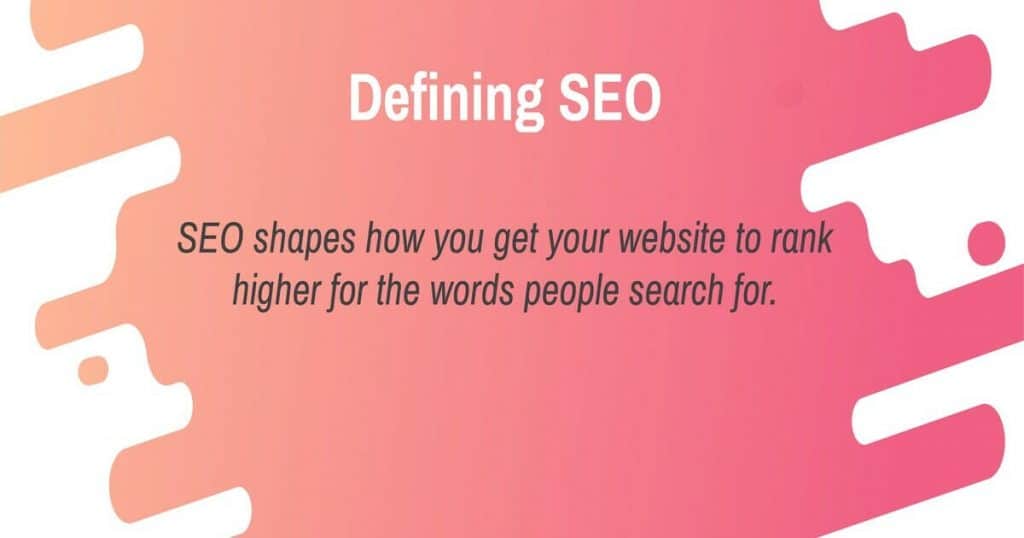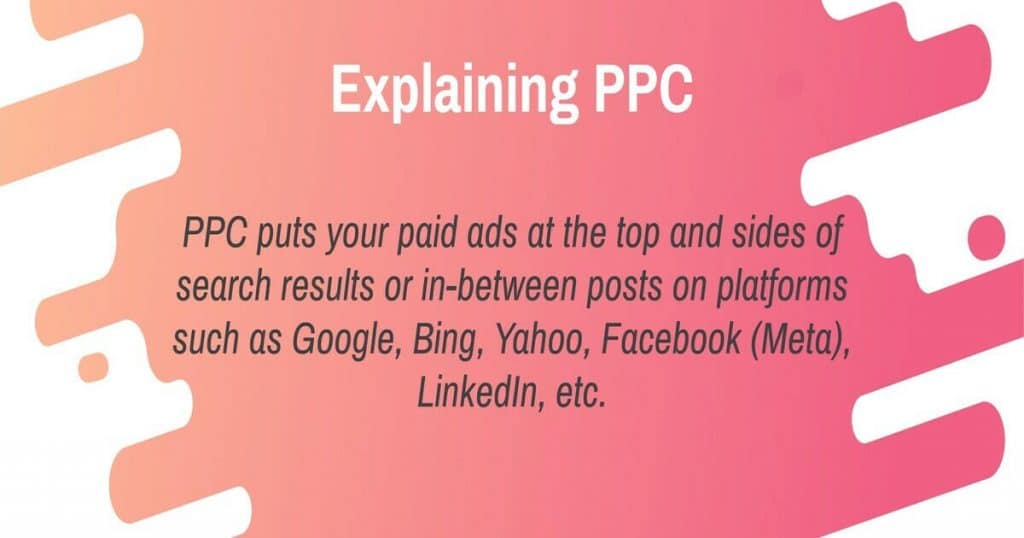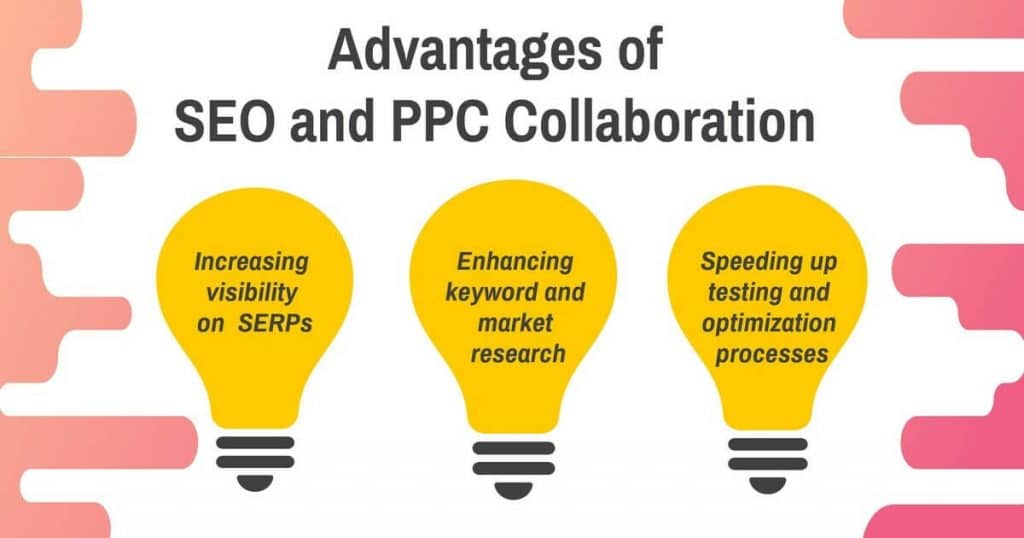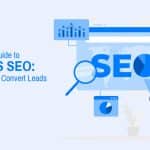Struggling to capture more attention online? I completely understand the challenge. Merging search engine optimization (SEO) and pay-per-click (PPC) strategies can make a real difference to your site’s visibility.
This guide will walk you through how SEO and PPC complement each other; both in improving your search rankings and also in beefing up your overall digital marketing game.
If you want to see SEO and PPC working together, brace yourself for some eye-opening insights to drive success!
PPC and SEO Working Together [Key Takeaways]
- SEO helps your website show up higher in organic search results for free, while PPC lets you pay for a top spot. Both strategies make your site more visible online.
- Using SEO and PPC together boosts your website’s chance of being seen by more people. It also helps you learn which keywords to use to attract visitors.
- Testing keywords with PPC before using them in SEO can save you time and money. This way, you only focus on words that truly work.
- Sharing insights between PPC and SEO improves both strategies. It makes sure your efforts are not wasted and increases the chance of getting more visitors.
- Retargeting with PPC brings back visitors who left without buying anything, while SEO brings users to your website through organic search.
Basics of SEO and PPC
SEO is all about getting your site to show up higher in online search results without paying for ads.
PPC, on the other hand, lets you pay for a spot right at the top of those search pages, enhancing brand awareness and visibility.
Defining SEO

SEO shapes how you get your website to rank higher for the words people search for. It’s like setting up a sign in the busiest part of town, but online. This process involves ensuring the website loads fast, reads well, and links nicely to other websites.
Did you know that when it comes to generating sales, SEO is preferred by 70% of online marketers over PPC?
What’s more, by choosing SEO, you can avoid an overreliance on ads. I also focus on getting more people to visit without paying directly for ads. This includes finding the right words (keywords) they use when looking for something I offer.
I make SEO work by tweaking parts of my website that you can see, like texts and images, and parts you can’t easily see—how it’s built underneath. It’s not just about stuffing it with keywords but making everything fit together perfectly, from the structure of the site to how other sites link back to mine.
Each step plays a role in boosting my spot in search results, always aiming for page one and the featured snippet spot. In SEO, every detail counts, from keyword research to linking patterns.
Explaining PPC

PPC puts your paid ads at the top and sides of search results or in-between posts on platforms such as Google, Bing, Yahoo, Facebook (Meta), LinkedIn, etc. You only pay when someone clicks on your ad. This makes PPC valuable for driving immediate traffic from customers who are ready to buy.
Use PPC for more than just quick wins. With remarketing campaigns, you can target people who visited but didn’t buy right away—making sure they see your ad again can finally convince them to make a purchase.
Combining SEO and PPC strategies can boost your website’s visibility in searches even more, hitting both short-term targets with PPC and building long-term trust through SEO.
Advantages of SEO and PPC Collaboration

Mixing SEO and PPC advertising powers up your online positioning. You show up more in search engine results, and you learn better what words people use to find content like yours.
Increasing visibility on SERPs
SEO and PPC work together to make websites more visible on search engine results pages (SERPs). You can use SEO for long-term growth by making sure your site ranks high for the right keywords. Then, you can add PPC ads to show up even more in searches.
This mix means your brand shows up twice, both as an ad and in organic results. A study from Google found that stopping PPC ads can cause a big drop in visitors; about 89% of traffic won’t come from organic searches alone. Using both SEO and PPC, you ensure your website stands out in a crowded market.
By focusing on important keywords for both SEO efforts and PPC campaigns, you can cover more ground. This approach doesn’t just boost visibility; it also builds credibility with users who keep seeing your brand everywhere they look online.
A well-optimized website also means a better user experience and, therefore, a greater chance of a higher return on investment (ROI) from PPC. Plus, getting data from PPC can help you understand what users want, so you can make smarter marketing choices.
Enhancing keyword and market research
I use specialized SEO tools, such as Ahrefs and Semrush, to peek at competitor keywords and their ads, which helps my digital marketing agency strategize effectively. I can craft a sharp keyword plan by looking at their domain rankings, traffic, and even the cost of that traffic.
A/B testing with PPC ads can then unveil gems for my SEO keyword list. PPC data shines a light on top keywords, user needs, and target groups. I then use NeuronWriter to fine-tune my SEO content to match these insights. Read my in-depth NeuronWriter review where I explain exactly how I optimize my blog posts.
Speeding up testing and optimization processes
PPC data can give you quick insights into which keywords work best. This way, you can test a keyword’s success before making big changes to your site. For example, if a keyword from PPC drives lots of sales, you’ll know it’s gold for SEO, too.
This saves time and money as you can avoid spending on low-performing keywords.
By tracking metrics on platforms like Google Analytics, you can make fast decisions. The most important ones include:
- Impressions
- Time on site
- Click-through rates
- Conversions
- Conversion rates
- Bounce and exit rates
- Return on ad spend (ROAS)
Seeing what grabs your audience’s attention helps you refine your web pages and optimize your budget as well. If a page isn’t drawing clicks or conversions, you should immediately tweak it using insights from paid ads.
“To monitor and optimize performance, our go-to tools include Google Analytics and Semrush. They provide comprehensive insights, bridging the gap between SEO and PPC data. By using these platforms, we significantly increased our website traffic twofold through an effective content strategy, showing the power of analytics in decision-making.” — Eva Miller, VP of Marketing, Digital Silk
Strategies to Merge SEO and PPC
Merging SEO and PPC involves making smart moves. Use insights from PPC to sharpen your SEO tactics, like refining keywords based on ads that get clicks. Then, tie SEO content with PPC re-engagement ads for visitors who bounced off your site.
This way, strategies feed into each other, lifting both your paid and organic search spots.
Applying PPC insights to SEO strategies
You can use PPC data to shape your SEO content. This step makes both strategies work better together.
Here’s what you can do:
- Identify high-performing keywords from your PPC campaigns. These are the words people often click on in ads.
- Next, understand user intent by looking at which PPC ads get the most action. This tells you what your audience really wants.
- Then, target relevant audiences by using demographic data from PPC. This helps you determine who is interested in your content.
- Adjust your SEO strategy based on what works in PPC. If a keyword or ad brings a lot of visitors, use similar words in your website’s content.
- Sharing insights between PPC and SEO saves money and time. It makes sure you’re not guessing what works.
- Your web pages climb higher in search results because you use proven keywords from PPC ads.
- To keep things fresh, test new keywords with PPC before adding them to your SEO plan.
Every move is a step toward making the most of digital marketing efforts to increase visibility and reach the right people online.
Using retargeting to boost engagement
Retargeting plays a key role in bringing visitors back to complete their journey. Using PPC for retargeting campaigns is a powerful tactic.
This method targets those who visited but took longer to decide. By employing this strategy, you ensure previous visitors don’t forget about the products or services offered and consider returning to make a purchase or convert into leads.
On the other hand, SEO attracts new potential customers through organic search. This dual approach creates a comprehensive and effective digital marketing strategy.
Look at these two fantastic tips from two experienced professionals, when it comes to mixing PPC and SEO:
“From my experience in running PPC campaigns and SEO together, you can use a shared content calendar for both. To avoid SEO content duplication, content should be different but aligned with the brand’s identity.” — Aneela Masoud, Business Consultant and Business Growth Specialist, WebSouls
“Incorporate user-generated content (UGC) from PPC campaigns into your SEO strategy to boost organic search rankings. For example, if you run a PPC campaign featuring customer reviews and testimonials, repurpose this content for SEO by adding it to product pages or creating dedicated UGC sections on your website. This not only adds credibility to your site but also enhances the user experience. Use tools like Yotpo or Trustpilot to collect and showcase UGC across both SEO and PPC channels.” — Michael Hess, Product Marketing Manager, Code Signing Store
Synchronizing content strategy across channels
Make sure all your content follows a unified theme across every platform. This means matching messages on social media, blogs, and ads.
Create specific content for each part of the buyer’s journey—top (TOFU), middle (MOFU), and bottom (BOFU). Examples include targeted ads for new visitors and detailed blog posts for those ready to buy.
To boost engagement, apply PPC insights directly to your SEO efforts. This guides you in creating more effective landing pages that match search intent closely, leading to higher rankings and better ad performance.
In turn, this creates a consistent brand experience that builds trust with users at every step—encouraging them to choose your brand when making purchasing decisions.
Case Studies: Effective Integration of SEO and PPC
In this section, I share the insights and real-life experiences of two industry experts. See how they combined SEO and PPC for even more effective results from their digital marketing efforts.
1. Dialpad’s integrated SEO and PPC approach
“At Dialpad, we’ve found great success in integrating our SEO and PPC efforts, particularly for our core product offerings like VoIP and video conferencing solutions. Our strategy involves using PPC data to inform our organic keyword targeting and content creation.
For instance, we analyze high-performing PPC keywords and use this insight to enhance our organic content. If a particular long-tail keyword about ‘remote team collaboration tools’ performs well in our PPC campaigns, we develop in-depth blog posts or landing pages optimized for that term. This synergy allows us to dominate both paid and organic search results for high-intent queries.
We also use PPC to test new markets or product features quickly. Before investing heavily in SEO for a new service area, we run targeted PPC campaigns to gauge interest and collect valuable keyword and conversion data. This informs our subsequent SEO strategy, ensuring we focus our efforts on the most promising opportunities.” — Debbie Chew, Global SEO Manager, Dialpad
2. Influencer service: SEO and PPC collaboration
“At Influencity, we’ve combined SEO and PPC strategies to boost our marketing efforts. For instance, when we launched our campaign for the influencer matchmaking service, we used PPC ads to target specific groups interested in working with influencers. These ads led people to a page designed to make signing up easy.
At the same time, we focused on creating useful content related to influencer partnerships and social media marketing to improve our visibility in search results. This ongoing content strategy helped us attract more visitors to our site over time.
By combining our PPC and SEO strategies, we created a balanced approach that brought immediate traffic through PPC ads and steady growth through SEO. We also used PPC remarketing to reconnect with users who had shown interest but hadn’t signed up yet, which increased our conversion rates.” — Dan Tabaran, Marketing Expert, Influencity
Conclusion
Maximizing results means SEO and PPC working together as a team. Boosting your site’s visibility isn’t just about choosing one over the other—it’s about using both to your advantage.
With SEO, play the long game, aiming for lasting traffic. PPC gets you quick wins with targeted ads. Together, they offer data to make smarter decisions and save money. By tailoring strategies like A/B testing from PPC insights for SEO keywords, you can see higher rankings, more clicks, and more conversions.
It’s clear—combining these powers, while adhering to best practices, does wonders for your online presence and budget efficiency.
FAQ
Does SEO have a direct impact on PPC, and vice versa?
No. Your PPC ads cannot influence your site’s ranking, and your site’s position cannot influence your PPC ads.
Can combining SEO and PPC improve my digital marketing strategy?
Yes, it can. Using both strategies means you cover more ground. You get data from PPC keyword research to inform your SEO content and vice versa, optimizing both organic traffic and paid ads.
How does using Google Search Console help integrate SEO with PPC?
Google Search Console shows how well your site performs in searches—useful for fine-tuning both your SEO efforts and informing your PPC strategy with solid data about what works.
Should I adjust my content marketing approach when combining SEO with PPC?
Absolutely. Use insights from running a PPC campaign to tweak your content marketing—making sure it appeals to what people are searching for. The opposite is also true.



